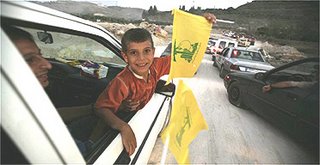Israel's Verdict: "We Lost the War"
From The Independent (UK) yesterday:
Ehud Olmert, the Israeli Prime Minister, was obliged to admit "shortcomings" in the 34-day-old conflict in Lebanon yesterday as he launched what may prove a protracted fight for his own political survival.
Mr Olmert's admission in a stormy Knesset session came in the face of devastating poll figures showing a majority of the Israeli public believes none or only a very small part of the goals of the war had been achieved.
Adding insult to injury, the leader of Hizbollah, Sheikh Hassan Nasrallah, crowed on television that his guerrillas had achieved a "strategic historic victory" over Israel.
The Prime Minister, who was repeatedly heckled by opposition MPs during his address, insisted the international commitments in Friday night's UN resolution would "change fundamentally" the balance of forces on the country's northern border.
Good luck selling that one. It's not often you see a head of state, victorious in a foreign war for the survival of his country, put under investigation for it by his grateful public. Does any of this sound familiar?
Israeli Defense Minister Amir Peretz on Wednesday created a committee to investigate Israel's conduct during the 34 day fight against Hezbollah guerrillas, senior defense officials said.
The committee, made up of business executives and retired generals, will be led by a former army chief and will look into the army's preparedness ahead of the fighting, the officials said.
The formation of the committee was a step toward addressing criticism over the handling of the crisis but fell short of meeting growing demands for the creation of an independent commission of inquiry to investigate both the government's and the military's performance.
The announcment came as demands mounted for the military chief's resignation, and the government came under increasing criticism over how the war against Hezbollah was waged.
Newspapers and radio shows were filled with outrage over army chief Lt. Gen. Dan Halutz's decision to sell off his stock portfolio just hours before launching Israel's biggest military operation since its 1982 invasion of Lebanon.
Meanwhile, on the other side of the boarder here is how the Lebanese residents, returning to their homes in the war zone, are mourning their "defeat" at the hands of Israel:
Returning to their devastated homes, the people of Lebanon claim victory
Declan Walsh in Aitta Shaab
Tuesday August 15, 2006
The Guardian
A Lebanese boy waves a Hizbullah flag as a stream of returning
refugees heads back to the city of Tyre. Photograph: Sean Smith
The war started in Aitta Shaab, where Hizbullah fighters stole across the border and kidnapped two Israeli soldiers one month ago. When it ended at 8am yesterday morning - and not a minute earlier - the tiny town bore fearful testament to Israel's wrath.
The town centre was utterly destroyed, reduced to a line of disembowelled buildings cloaked in ashen dust. Gigantic craters pitted the roads. Scorched vehicles slouched in the gutters.
Yet for the townspeople who slowly trickled home, many to decimated homes, the bombs had failed to obliterate one thing - a defiant sense of victory.
"I feel joy," said Ibrahim Awada, whose grocery store had been flattened, house destroyed and three neighbours killed. "These buildings can be rebuilt. All I care is that Hizbullah defeats Israel."
Police officer Sameeh Srur embraced Hizbullah fighters, kissing them on both cheeks. "Yes, it looks like Leningrad," he said, referring to the Soviet city that braved the brutal German siege during the second world war. "But we brought the Israelis to their knees here. This shows that Hizbullah is the strongest army in the Middle East."
It all keeps coming back that poll. Because of the Israeli attacks, Hezbollah enjoys an over 80% approval rating among Lebanese of all religious persuasions. Even the Christians approve of their actions by over 80%. This cannot be dismissed as a quirk peculiar to muslim extremists and their "totalitarian ideology". It turns out once again, despite our many efforts to convice ourselves otherwise, that people don't like being bombed, not even for "freedom", not even for "a new middle-east".
It is a shame that such a thing actually needs to be explained.






0 comments:
Post a Comment